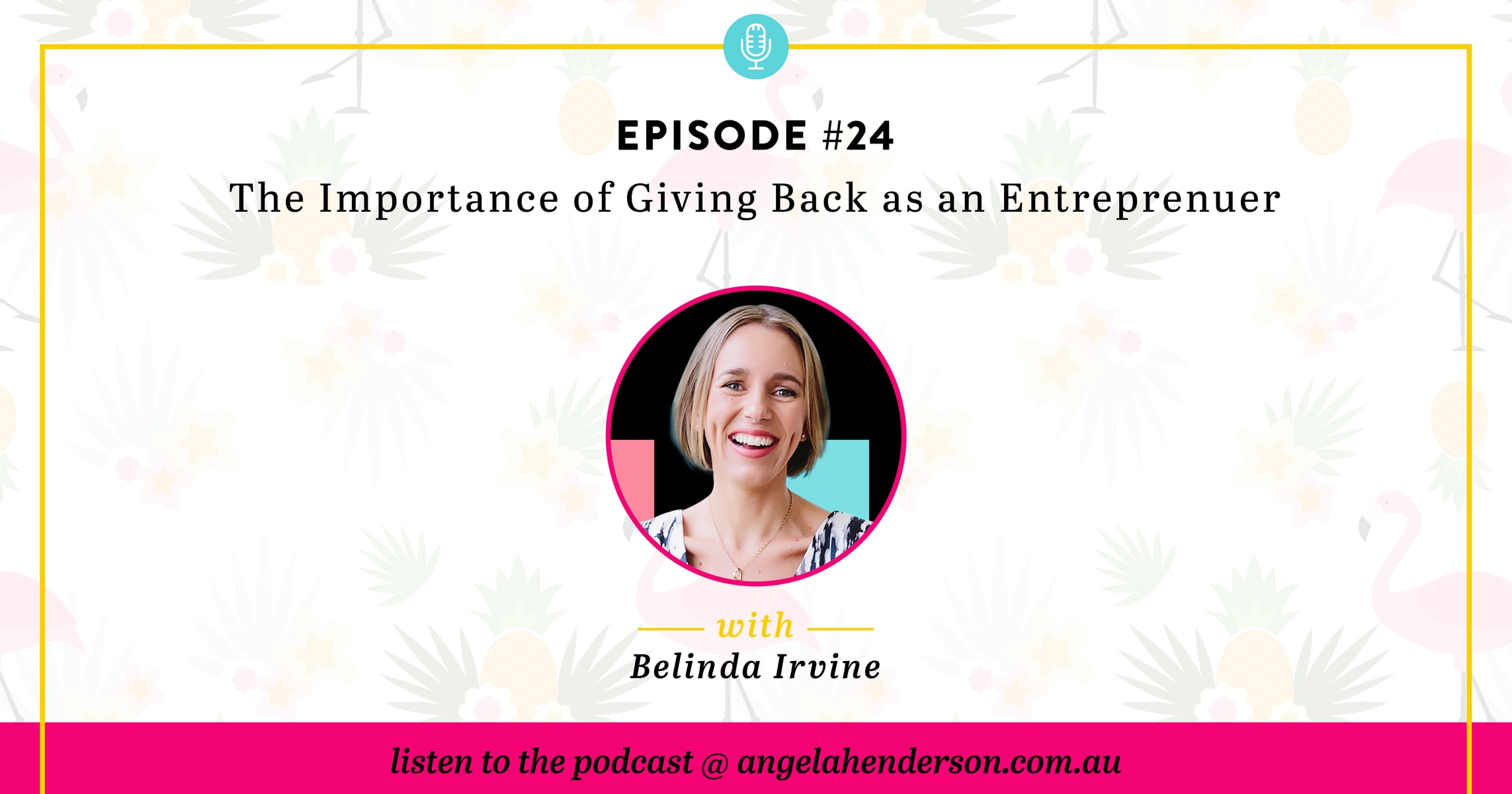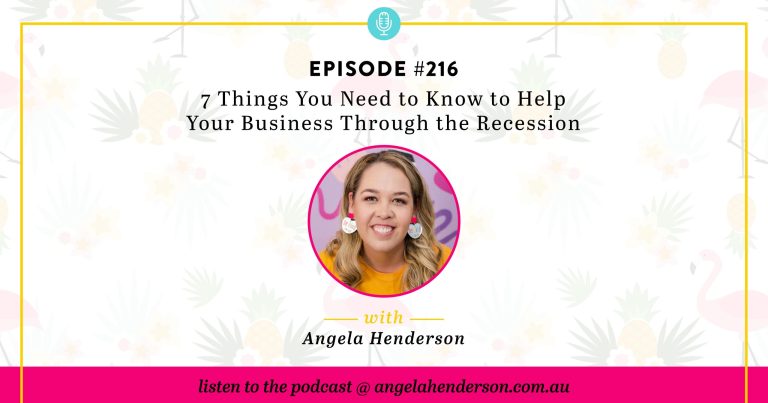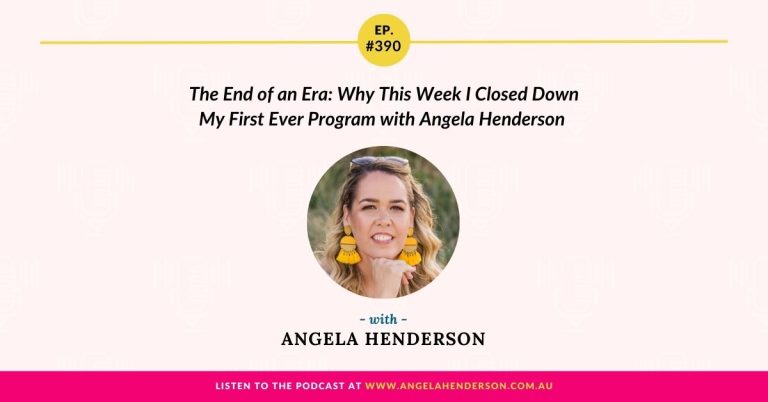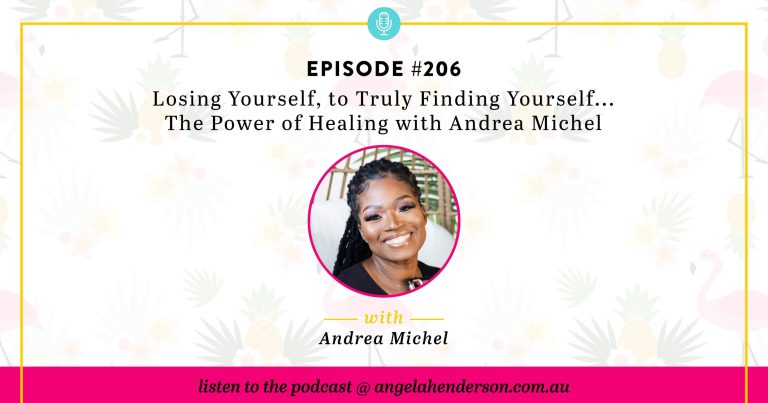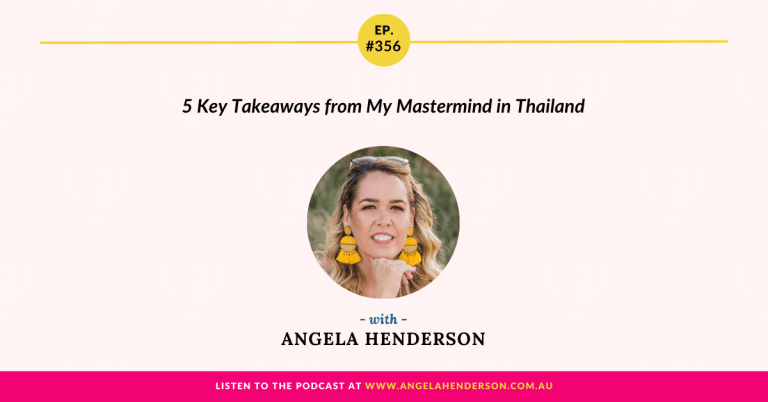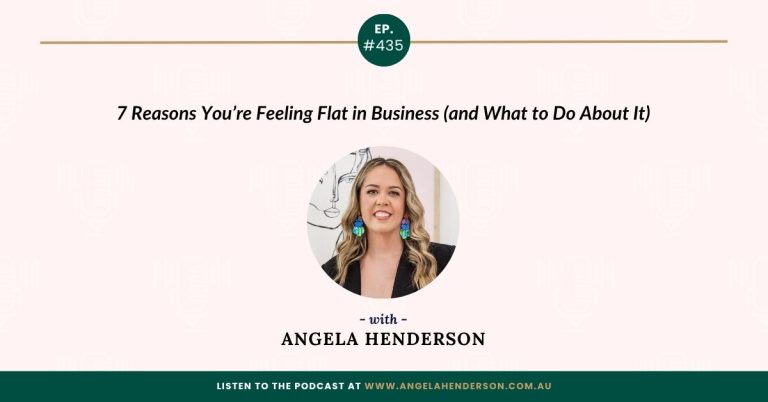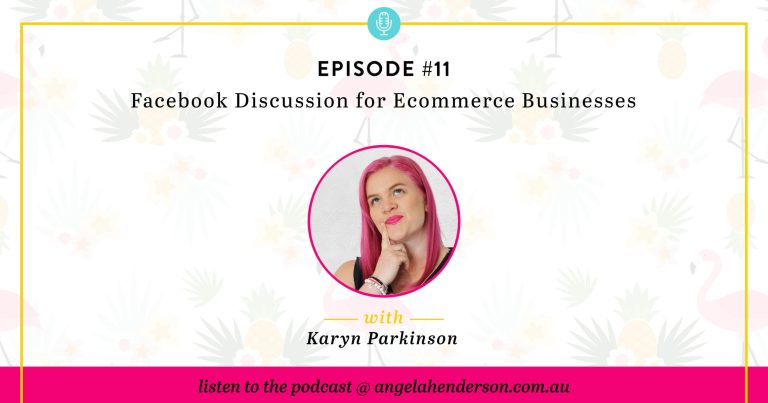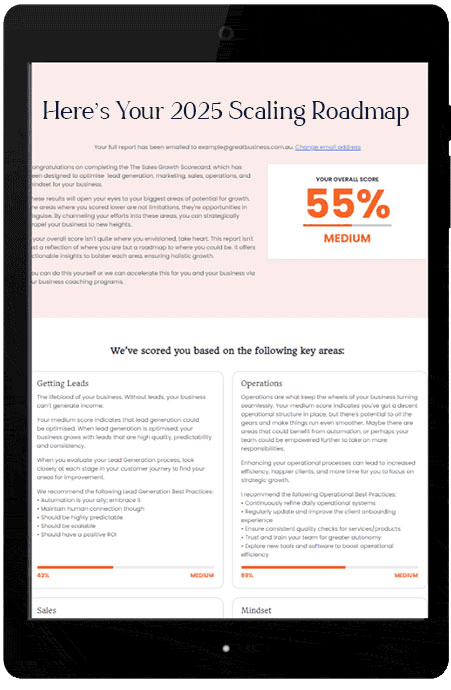Have you ever wondered how giving back as an entrepreneur can help you, as a business and as a person, become better and make your life fuller? Belinda Irvine, an SEO consultant, and digital marketer shares the story of how she has helped a local Fijian lady, Etta, in this episode. She has mentored and coached this hardworking lady and has made a difference not only in Etta’s life but in her family’s life as well. She shares the benefits of giving back and how you can do it in your own little way.
Important Links Mentioned in the Show:
Angela Henderson Active Business Facebook Group
Angela Henderson Facebook Business Page
Prefer to read The Importance of Giving Back as an Entrepreneur? Here’s the transcript:
ANGELA:
You’re listening to the Business and Life Conversations podcast, with Angela Henderson, episode 24.
Hey there, you’re listening to the Business and Life Conversations podcast, my name is Angela Henderson, and on this show we talk about improving your business, life or both. By having amazing and rich conversations with brilliant guests. Who will inspire you and who will give you tips and tricks, to help you grow both in life and in business.
Hey there and welcome back to another episode of the Business and Life Conversations podcast. I’m your host, Angela Henderson, and today I’m going to introduce you to the most amazing person who lives in the sunny Fiji Islands, Belinda Irvine. Belinda is an SEO consultant and digital marketer, but today we’re not going to be focusing on SEO or marketing. But rather Belinda is going to share one of the most beautiful stories I’ve heard in a very, very long time.
We’re going to have a rich conversation with Belinda about how she’s giving back to the business space by mentoring an up and coming local Fijian lady by the name of Eta. So sit back, take a minute, enjoy this beautiful conversation about the importance of giving back as an entrepreneur. Because it will get you thinking about what you can be doing to give back in your business and make your life fuller. Welcome to the show, Belinda. I’m super happy to have you on today.
BELINDA:
Thanks for having me, Ange. It’s great to have a chat about this.
ANGELA:
And so how is Fiji today? You must tell us.
BELINDA:
Fiji is excellent and it is 27 degrees in my office, but that’s only ’cause I’ve got the air conditioning on to keep things quiet. It’s probably about 30 degrees outside and sunny, so it’s pretty amazing.
ANGELA:
It is. Listen, I used to work in Fiji for many, many years and I love everything about Fiji. But for my listeners, I always like to allow them an opportunity to get to know the person that I’m interviewing before we jump into everything. So tell us one really cool part of Fiji that you really love. Like what is it about Fiji that you’re like, “Man, this is actually a little slice of heaven?”
BELINDA:
Yeah, look, my little slice of heaven is reached by a boat. We have a boat ourselves that we can sleep on, which is really quite cool. And we go about three hours north of Nadi or where the airport, main airport, is to a place called Blue Lagoon. And you probably remember the movie if you’re old enough with Brooke Shields from a million years ago. I was almost too young to see it the first time around. But that’s where the movie was filmed. And so we go up and anchor our boat in a very sheltered bay, and kind of just hang out for three or four days. And we’ve got to know everybody up there, and swim and set up paddleboard and my husband goes fishing. And it’s just, yeah, literally our little escape.
ANGELA:
A little piece, literally of awesomeness. And, I mean, let’s be honest, the Fijian people are some of the friendliest people in the world. So, I mean, just being around. I mean, they’re happy. I mean, not that they don’t ever get sad, but there is an element of they don’t let things bother them the way the majority of us first world people do. Would you agree?
BELINDA:
Yeah, that’s absolutely right. And sometimes whilst it’s not a great thing, but it very much can be. They live day-to-day mostly. And that brings with it some benefits.
ANGELA:
Yeah. You’re not forward planning or what’s happening yesterday, what am I doing today and what am I doing five years from now? They’re just kind of, like you said, they’re in the moment a lot more. I remember when we were in Fiji this year. This year or last year? This year, I think it was, early January. And Finlee was saying to me, “Mum, that man has been sitting by the tree for like three hours and he’s still smiling. Why doesn’t he want to get up and do anything? And the kids around him are just playing and they’re happy, but they only have a ball and sticks, mum.” So it was an eye-opener for someone. Obviously my kids, they do get a lot of outdoor time but they equally get a lot of iPad time.
And I was like, “Yeah, but, Finlee, he’s content.” And he’s like, “But why would you just want to sit there?” And he was like, “Because I can’t sit still.” And I was like, “But he’s happy, Finny.” And he’s like, yeah, he’s like, “Our happiness is different.” I said, “Well, not necessarily.” I said, “but he doesn’t need everything. He’s fine with what he has.” So it was a good, interesting conversation to have with a nine year old because it’s, yeah, I think children these days, they take things a little bit more for granted.
BELINDA:
Yeah, absolutely.
ANGELA:
So for the businesses that are listening, obviously you live in Fiji. You’re Australian based though, a Sunshine girl. But tell the listeners a little bit more about what you do, how you got started and how you currently make your living today, so we get a bigger picture of you.
BELINDA:
Yeah. Look, so I run an online digital marketing agency that started out with just me. Offering all things to all people that I had the skillset for. So I used to manage social media. I’ve done website maintenance, I’ve built websites, I’ve project managed websites, I’ve done a whole pile of things. Basically, you name it, I’ve done it. And then at some point I decided that in order to be a specialist in one area you literally have to just specialise. And these platforms have become so specific that I really, truly believe that you can’t be an expert of all things. You can be a jack-of-all-trades but you can’t be an expert.
So a couple of years ago I decided to specialise. And so now it also provided an opportunity to scale my business in that I personally focus on SEO because it’s the thing that floats my boat. And my other skillset is project management. So instead of building the websites now and managing the social media accounts, and being the doer, I now have a team of eight that does the doing. And I only do the doing when it comes to the SEO stuff. As well as, don’t get me wrong, there’s a pile of hours coordinating all of the project management clients. Depending on how amazing or not your clients are. But that’s probably a whole other topic for a whole other day.
ANGELA:
But, yeah, so you’ve grown from just you.
BELINDA:
Yes.
ANGELA:
And obviously, like you said, being the jack of everything to everyone. Where really honing in on a niche here because for those who might just be tuning in for the first time, you have to niche in business. You have to or else it’s going to be exceptionally hard to scale, but equally hard to start creating a brand for what you do because people are going to be like, “Oh, she kind of does everything,” or “I don’t really know”. So good on you for being able to really hone in and niche down. But equally for growing your team, so going from you to now a team of eight. It must be, like you said, there’s challenges that go with it but still equally rewarding.
BELINDA:
Yeah. Yeah, absolutely. And what you’re saying about niching, I had become that person who, “Oh, yeah, Bel does SEO”. And as much as I do other things, SEO being my thing, it was my thing. Like that’s literally what came up for me when I looked at all the bits and pieces that I did and decided which was my favourite thing. It chose me rather than the other way round, but because there’s not too many people offering SEO services and it just makes it easy from a marketing point of view that you get known for that thing. Even though probably more than 50, probably 70% of my clients get other services done with me as well. Because once they’re with me they see how I work, they see how I operate, and they’re like, “Oh, can you do this for me as well?” And that’s where my team comes in.
ANGELA:
And 100%, and I think that it’s important to remember, as you said, is that you become known. So I know, for example, if someone asks. And again, there’s not many. I think again we need to say it, there’s lots of people who do SEO but there’s not a lot of people who do it well and have their ethics intact.
BELINDA:
Yeah.
ANGELA:
There’s a big difference and they actually don’t think about it.
BELINDA:
I was trying to not say those things.
ANGELA:
Yeah, but you know me, I’m very blunt. And let’s be honest, there’s a lot of people who claim they know but they’ve taken a course or no course and so they do it off a back of a cereal box. So that’s another conversation for another day. But, yes, but you do it well and again I’m in a lot of similar groups as to what you are in, and your name gets tagged all the time specifically ’cause you’ve niched. But again, I don’t want to get too much into SEO and niching because again that’s a full other podcast for another day. Because you have the most beautiful story I want to share with the listeners today, and about how giving back in business is such a good thing for both the person you’re helping, yourself, your soul.
And what I know of you, we’ve known each other for a while now, is that you have a big heart. You’re super caring and you’re just a great person. But I’d love to know why you think it’s important to give back in business and expect nothing in return.
BELINDA:
Yeah. Look, it’s in business but it’s also as a person. I find, and this wasn’t a conscious choice, this wasn’t, “I’m in business so therefore I’m going to give back”. It was more a case of I’ve got energy to give and to share, and I can make a difference. And I don’t want to sound like I’ve got an ego here, but I said to myself, “I can make a difference to someone’s life.” And I get to do it first-hand here in Fiji, and probably the differences that you can make to someone’s life are far more substantial then potentially in a developed nation. Because you might be dealing with someone with a high school education, maybe not. It’s just a different culture.
And I guess the income levels that are here are substantially lower in most cases. So whilst there’s underdeveloped people in every country, and certainly lots of people that can be helped anywhere, I really felt like I could make a substantial difference here in Fiji. And wanted to do so. And so, yeah, that’s where Eta comes in.
ANGELA:
Yeah. And so Eta. So take us back, because obviously today we’re talking about Eta and the beautiful relationship that the two of you have. But go back though so that we can kind of get that story part of it. Take us back to when you first met Eta. Where was she in business and what type of business does she run, so we can kind of start to put the story together?
BELINDA:
Yeah. Well, it’s funny that the question is where was she at in business because she actually wasn’t. So, Eta came to me as an employee who was not being treated all that well by her employer. And by that I mean being overworked and not paid for public holidays and the like. And she had had enough. So a friend who was a mutual acquaintance of ours actually put a message on Facebook, and I saw that she was looking for work. And there’s a lot of people in Fiji, a lot of ladies in Fiji, who work in people’s houses as a housekeeper or a helper. I refer to ladies as helpers. Doing basic housework, cleaning, ironing, all of that sort of stuff.
So that’s actually how Eta first came to me, is I found an ad on Facebook. And when I first met Eta I thought, “Wow, this lady is far too intelligent and it’s too much of a waste of an epic human for her to stay as my helper forever.” So, from that minute I knew it was doing myself a disservice, but from the minute I met Eta I worked with her to develop her resume, to talk to her about what she wanted to do in her life. She had certain family members who thought that economics and accounting would be a really great path for her. But having worked through, we started from scratch, we worked through everything. What do you like? What you don’t like? Do you sleep well? Do you like to travel? All of those things that can form part of deciding, hey, what job you’re going to do.
So she didn’t even know necessarily what she wanted to do. She’d finished high school, she’d done a couple of cooking certificates. She’d had previous full-time employment and she’d moved from one side of Fiji to the other, which is why she was doing the cleaning work when she came to me. So, look, over time I’ll skip a couple of years in that she actually got a job with community health via another contact she had. And then she went out and she worked. She got a job as a massage therapist working for one of the resorts via another contact. And they found her because she does really excellent braiding of hair. So those two things all helped her get that first job.
That was after we had identified that all she wanted to do, I shouldn’t say all because it’s epic, she wanted to do beauty. Now, a lot of people might think that that’s not aiming for the stars. But when I tell you what I’m going to tell you today, you’ll realise that you can do just about anything and make a damn good living out of it. So yes.
ANGELA:
So still, like you said though, when you first met her having her own business wasn’t even on the cards.
BELINDA:
No.
ANGELA:
She simply was looking for work because she’d been treated unfairly, poorly. You hired her on to help you and your family out in Fiji.
BELINDA:
Yeah.
ANGELA:
But then further to that again, just talking to you, you have a beautiful relationship with Eta. And you really mapped out product ideas, validating it. You know, what her skill set was. So then eventually, then what happened? Did she get sick of working? Did she get sick of the nine to five?
BELINDA:
No. So what happened is that there was actually a course that we had applied for the previous year and she wasn’t successful in. Because what I need to say to you is that Eta is actually from Lau, and Lau is a group of islands that if you took a very slow boat would take 24 hours to get there on the ferry from Suva. It is in the Forbes Top 10 most amazing places on the planet. And because of that she was considered remote. And because of that, she was actually eligible to apply for a scholarship to do a Cert IV in beauty therapy. She fulfilled the criteria.
BELINDA:
So, I helped her fill out her application. I do very much a teaching role. I do not do things for people. And, look, it takes three times as long but that’s fine, that’s not the point. And we applied and the second time around she managed to get it. So, she worked damn hard for eight or nine months doing her Cert IV. But during that time, I almost forget now how it actually came about, but I had had a mobile message lady come to my house and give massages. And I thought, and this probably links in to one of our other questions today, and I need to mention the wages in Fiji. So the average person in Fiji earns I think the minimum wage is about $2.50 an hour. But the average is probably around about three to four dollars an hour. So the most that she would expect to earn, and we’re talking Fiji dollars so for easy maths it’s not quite this, but for easy maths halve it to go to Australia or the U.S. Give or take.
So she’s earning like $2 Aussie an hour, and the most she can expect to earn in a day is about 40 bucks. And she’s probably going to work for six days a week. So you’re looking at 200 to 250 dollars a week income. Which, let’s assume there’s four weeks in a month, you’re looking at a thousand bucks a month.
ANGELA:
Yeah.
BELINDA:
That’s what you’re looking at. So partway through her doing her course, I thought she needs some practice, she wants to do massage and I don’t want her to work for a wage. I don’t want her to work for $2 Aussie or $4.50 in an hour for the rest of her life. And then I had had the mobile massage come to my house. I’m like, right, we need to set you up in a business that’s mobile because she can’t afford rent on a premises and we can’t afford for marketing and we can’t afford this. We literally worked off a basis of no budget. Zero money. The only thing that I’ve ever played the bank for, and it has been a loan, I have given Eta one textbook and a few meals and that’s about it. The only thing that I’ve ever paid for is equipment.
So at that point in time I bought her, we researched it together and we bought a really high quality, amazing mobile massage table from Brisbane. And we brought it back to Fiji. And halfway through her course she started doing … Keeping in mind she’s studying six days a week, so on her only day off she would come to my house. And I live in a suburb that has about 20 houses in it, and we spread the word via social media and WhatsApp to my suburb and let them know that Eta was going to be at my house on a Sunday and massages would be 30 bucks.
She wasn’t going to charge for them.
ANGELA:
No. No, Eta, you must charge, you must charge.
BELINDA:
I asked her. Yeah, so that was my first thing. I’m like, “No, dude, absolutely not. You’re not going to charge retail.” The absolute cheapest retail for a massage here in Fiji is 50 Fijian an hour. You’re not going to charge that ’cause you’re not qualified, but you’re absolutely going to charge $30 because how else, she had a small allowance as part of that course, but how else are you going to eat?
ANGELA:
Yes.
BELINDA:
How else? I said, “How are you going to get here? If I can’t pick you up and the buses don’t run on a Sunday, how are you going to get here in a taxi if you can’t afford to get here?”
ANGELA:
Exactly right.
BELINDA:
So we talked through all of that, and every time we turned around we learned lessons, we have conversations. Even today, she’s come to my house today, completely different situation which we will get to. And now we’re having a conversation about completely different topics, but every time I see Eta she must get sick of me. Every time I see her I’m like, “Right, so what’s going on? What are we going to do now?”
ANGELA:
Yeah, so she’s finished the course?
BELINDA:
So she finished the course.
ANGELA:
Yeah?
BELINDA:
She graduated dux of her course. We knew she was in the first top two or three. We had no idea. It was one of those amazing, genuine surprises where both of us cried. Because I went to her graduation ceremony and her dinner. That was epic. And then the ball had already started rolling at that point. So we’re like, right, what services are you going to offer? Oh, by the way, the whole massage table money thing, I bought that and she paid it off. So we have what we call the red book, and she’s diligent. And when I get a massage now or my nails painted, it gets written in the red book. And basically I prepay for a whole pile of beauty services. Happy days.
ANGELA:
Yeah, perfect.
BELINDA:
Yeah. So now it was thinking about what services we’re going to offer. And the long and the short of it is that we’ve bought hot rocks, we’ve bought facial lotions and potions. She’s got a waxing kit. She’s got everything that she could need. She’s got makeup. I think there’s only one thing, someone mentioned tinting of eyelashes. And I’m like, “Damn, I hadn’t thought of that.” So possibly that will be added now. But each time she pays something off with me we buy another service that allows her time to get used to offering that service and clients time to get the idea that she does offer it. She gets to practice on people.
At the same time as she finished the course, there’s two careers kind of going on here that have been blended. I did not want her to have no team around her. I didn’t want her to have no friends in the industry. I just didn’t want her to graduate and then be on her own, living by herself. She’s supporting herself entirely, by the way. She rents a house. Her brother lives with her sometimes, but her parents are not in the area so she’s completely independent and supporting herself.
ANGELA:
That’s awesome.
BELINDA:
So I rang another friend of mine, ’cause everyone knows everyone in Nadi Town, and she owns an amazing hairdressing salon. And I didn’t have any intention whatsoever of her getting paid work or staying there for a long time, ’cause Eta had said to me that she wanted to save up her money and go to Lau ’cause she hadn’t been home to Lau for two years.
ANGELA:
Wow.
BELINDA:
She wanted to go over Christmas. And I said, “Well, don’t go applying for a job in a big resort and then have to tell them that you want to take holidays. But I also don’t want you to sit around doing nothing.”
ANGELA:
Sure.
BELINDA:
So I rang Leanne and I said, “Can she come in just for some work experience? You know, to meet some people and she’s really excellent at braiding, and she’s a good egg.” And Leanne said, “Yeah, you wouldn’t be telling me about her if she wasn’t amazing.” So, yeah, that turned into work experience that turned into training that turned into I didn’t even know this job existed. So in Australia, if I was to go to a wedding I’d get my makeup done maybe. I’ve only ever had that done twice by somebody. And I’d have my hair done by a hairdresser. I never even knew that there was a position called a stylist that did both.
ANGELA:
Okay.
BELINDA:
So she’s now being trained by this hairdresser who does all of the weddings in Fiji when ex-pats come over here to get married. She’s now trained Eta fully in wedding hair. So, if you want an up style or fancy curls, she can do your curls for you standing on her head now.
ANGELA:
Yeah.
BELINDA:
And she’s just started in the last month doing the makeup training component of that. So along with her wages are now excellent, and we’ll get to that bit, but I also needed her to have some reliability with her income. So by connecting up with Leanne, once we knew it was going to turn into a job, she has now got, it’s not guaranteed but she’s routinely getting two, maybe three days a week working as a contractor for this hairdresser. And having a team around her and the colleagues and learning stuff, and feeling like she’s part of a group. And then goes off and makes even better money when she’s working for herself.
ANGELA:
And how has this particular element been beneficial, not only for Eta but I would also say for her family? Because not that family is not important in every country, but specifically in the Fijian culture when I lived there, family is very for, you know, you’re always looking out for your family. And even though she’s not from Fiji, how has this, opportunities that she’s had and all the hard work and action she’s taken, helped not just herself but also her family?
BELINDA:
Yeah, yeah. So when I say Lau I actually need to just tell everybody Lau is in Fiji. So she might be from a pile of islands but, yeah, so she’s Fijian.
ANGELA:
It’s part of Fiji and, okay, yeah, I’m sorry.
BELINDA:
Yeah, yeah, yeah.
ANGELA:
You were saying, though?
BELINDA:
Yeah. Look, she often has been left as the soul carer for her two younger brothers. And that was a struggle and a half. More than a struggle and a half when you’re on a scholarship earning a very, very small allowance, literally to keep one person going, let alone two or three. So, to now be comfortably able to support her family, or her brothers at the very least ’cause her sister’s independently married and has a child. Yeah, that’s just literally life changing.
ANGELA:
And I can imagine again, has she been back home yet?
BELINDA:
Yeah. So last Christmas, so we had the first one … Actually, no. Yeah, last year was the first Christmas. So that was just incredible. She said that she just thoroughly enjoyed it. And I think this Christmas will be an entirely other ballgame, ’cause last Christmas the ball had just started to roll. This Christmas it’s tumbling down the mountain.
ANGELA:
Yeah, she’s doing ethically well. So tell us a little bit about that. So we know about the Fijian wage. So again, for those just to recap, she’s roughly on $2, two dollars and fifty cents an hour, give or take.
BELINDA:
Yeah.
ANGELA:
If she were to go into a mainstream working job at a resort potentially in Fiji. However, through obviously again getting her degrees, being teamed up with Leanne, doing some work experience. So what did we say? About a thousand dollars a month is as much as Eta could ever make in a resort, and that’s working six days a week. And it’s a hard slog because again, depending on where the resort is in Fiji, your travel time. You’ve got to wake up, you’ve got to take the bus back or etcetera.
BELINDA:
Yeah.
ANGELA:
It’s not just a typical work day.
BELINDA:
No.
ANGELA:
It’s you have to get up early, you get home really late, and again you typically work six days a week. However, so going from $250 a week, tell us about when you started working with Eta where she was and where she is at now from a financial point of view.
BELINDA:
Yeah. Look, I had to take things back to basics ’cause, keep in mind, Eta’s got a phone, like a digital phone that has Facebook and the like. But that’s it. She didn’t have a computer. I couldn’t set up a spreadsheet and say track your expenses on this accounting package.
ANGELA:
Yeah.
BELINDA:
Let alone, even on an Excel spreadsheet that costs nothing, because anything that costs anything was completely out of the question. So I had to completely change my thinking, and it was interesting because I’m like full on Miss Electronic as I don’t want to touch a piece of paper. So it really stretched my brain. But I’m like, “Right, how are we going to do this?” So, again, it couldn’t cost anything. Everything couldn’t cost anything.
BELINDA:
So in the end I jumped online and printed out a calendar for her based on a free template. Printed it out on my printer and I’ve given her a yearly calendar. So she would write the name of the person. She’d go Bel, $50. Oh, that was the other thing. We put her prices up. So we got everyone hooked. That was the plan. And then the minute she graduated she put her prices up to the base level, “I’m finished, I’m professional,” wage. Or not wage. Price, I guess.
ANGELA:
Yeah.
BELINDA:
Yeah, so whenever she gets an appointment, we would write the appointment on the calendar so she’d remembered when it was and all that sort of stuff, and put the value beside it. And then at the end of every week she would add up the totals, and at the end of every month she would add it up. Now, I had to step it through with her even the basics of how to calculate an average. Because we wanted to compare it back to what she would have earned, which was that $40 a day.
BELINDA:
Now, in the first probably four months I had to ask her to do it. I had to remind her twice. And it wasn’t that she wasn’t diligent. She’s always been diligent with her work. But she just wasn’t focused on the money because their mindset is just so completely different. And I said to her, “This is not about being materialistic. This is not about chasing the dollar. This is a measure of how hard you are working and it’s okay to celebrate.”
So now fast forward another year and I get messages from her last night.
ANGELA:
Yes, you sent me that and I was like isn’t it funny how we’re meeting today to have a conversation about Eta and where she’s been. And, yeah, you sent me that screenshot. So share with everyone what the screenshot said.
BELINDA:
So she said … Oh, it almost makes me cry. She sent me a message last night and she said, “Bel, $2,490 from the first of the month to the 23rd of the month. Already beat my record from last month, which was $2,350.”
ANGELA:
Dude, how amazing is that? So she’s almost on par to make $3,000 this month, which is theoretically about, what, 750 a week? Is that right? 750?
BELINDA:
Yeah, I’ve just done that. No, 700 a week, yeah, if you divide it out. I said to her, I actually wrote that back to her, I said, “Do you think you’ll crack 3000?” And she goes, “Yeah, I think so.” She said, “This week alone I made more than a thousand dollars.”
ANGELA:
So to go from working in a resort six days a week and making $250, she’s now making, let’s just say, a thousand dollars a week potentially. Again, I mean, obviously this is a great week. But how phenomenal is that?
BELINDA:
Yeah. And so, look, then that’s a whole pile of different conversations kick in because it is seasonal here. And I do think for her the ball is rolling, but it’s definitely seasonal with regards to the weddings.
ANGELA:
Yes.
BELINDA:
So we then had a conversation of make, “Hey while the sun shines, and don’t expect that it’s going to be like this in December. And, you know, put some money”. She’s not a spender, which is excellent. But, “Where are you putting that money? Okay, is it in the bank? You know, what are you doing with it?” So I cover off with her everything. Not just the business stuff but the personal stuff, and assume nothing.
ANGELA:
Yes.
BELINDA:
And then she’s even getting … The conversation today which I alluded to at the beginning was to Eta, “Are you eating properly? I know you’re standing up all day, I know you’re massaging all day. I know you’re tired but your heart needs to get fit and needs to be healthy. So I don’t need you to do it every day, but at least three or four times a week I need you to go for half an hour walk to get that heart rate up.”
ANGELA:
Yes. So like what are her thoughts? ‘Cause again also theoretically a generalisation, the Fijian community, they don’t show a lot of emotion. Like they’re happy people but they’re not generally like fist pumping, technically like some of my American friends are. Or they can, like you said, still celebrate but they’re quite reserved people. Not, again, everyone but, let’s just say, as a community, as a culture. How has Eta been? Like what are her thoughts? From when she reflects on where she was and where she is today with obviously the beautiful assistance from you, what does she say?
BELINDA:
Yeah. Look, there are some days where I think she is very quiet and I think, “Is this sinking in?” And then there’s days like last night where she sends me that message, and I can see the smile on her face without actually seeing her. And then today I saw her and she’s got a grin from ear to ear, and the eyes are just sparkling, you know?
ANGELA:
Yes.
BELINDA:
And she just completely gets it. And she’s motivated, and I’ve always said with any charity work that I’ve done, because she wasn’t the only one, I’m here to help people who are willing to help themselves.
ANGELA:
Yep.
BELINDA:
And if you don’t do your bit, I’m out. And I don’t care if that’s right, wrong, according to the textbook or not.
ANGELA:
Yeah.
BELINDA:
I’m not going to do it for you and I’m not going to be here. I will put in as much or more energy than you will, but you need to do your bit.
ANGELA:
Yeah, But Eta though, from the very beginning she’s taken it on board and she’s been an action taker.
BELINDA:
100%.
ANGELA:
And regardless of who you are, African, Fijian, Australian, American, Canadian, if you take action your business will succeed, you know?
BELINDA:
Yeah.
ANGELA:
Eta from what I know, I mean, we’ve been friends for a long time, Eta is always working hard. Always trying to think of, always she’s an action taker.
BELINDA:
100%.
ANGELA:
And under the guidance of you has been great, but that’s what I say with my own one-to-one coaching clients is they’re like, “Thank you so much. It’s because of you I’m here.” I’m like, “Yeah, I guided you. I was your tour guide but at the end of the day you’ve still got to make the decisions and you still took the action. So this could have been a very different story if you didn’t do that.”
BELINDA:
Yeah. And especially here culturally, not to go into too much of that detail, but the story could have been very, very different.
ANGELA:
Yes.
BELINDA:
You know, the motivation needs to be there, the willingness needs to be there. And it’s just such an epic situation to be sitting there this morning chatting to her, discussing that perhaps she might need to hire her own helper.
ANGELA:
Yes. How cool is that?
BELINDA:
Because she said to my neighbour this week, who repeated it to me, “I’ve never understood what it meant to not have enough time to keep your house clean. Or not have enough time to do stuff.” And she said to me this morning, “Bel.” She goes, “You should see my house.” And because keep in mind at the moment, like I went to Australia for 12 days and I’ve been back for three, and she hasn’t had a day off in that time.
ANGELA:
She’s been flat out. Go, go, go.
BELINDA:
Yeah. And that’s where the conversations about, “Are you eating properly?”, come in.
ANGELA:
But again, you did a really great job ’cause, like you said, you’ve not looked at it from a business point. You’re taking a holistic approach and I do the same thing with my own coaching clients. Like you can’t not talk about food or sleep and still talk about business. They all go hand in hand, and without one something else falls over. Like it has to be a holistic approach.
BELINDA:
Yeah, 100%.
ANGELA:
Now, you’ve worked with Eta and I know you’ve worked with others, but we’ve also had a few conversations over dinners and wines where you, again with your own business, you want to get to a stage where you’re able to. Tell us a little bit more about what you ultimately would like to do. ‘Cause, like I said, you’re a huge giver.
BELINDA:
Yeah. Look, I like the one-on-one and I have no plans past one-on-one, unless a project that takes my fancy comes across my desk or my phone. I really enjoy the one-on-one. And I’ve said this to Eta a couple of times already, you know, there’s only been one or two times where I’m like, “Dude, you need to get your shit sorted”. I don’t know if I can say that on a podcast. “But you need to take that action because I’m not going to be here forever and I need to remove myself from your scene, from assisting you.” Because I need to go and find my next Eta.
ANGELA:
Yeah.
BELINDA:
So I aim to get somebody up and running and self-sufficient. And Eta’s nearly there in terms of having all of her equipment now, and she can afford to replace her supplies and all of that sort of stuff. And I’ll always be her friend and she will always be a bit in my life, ’cause she’s extra special to me.
ANGELA:
Yeah.
BELINDA:
But I need to go and find my next Eta and help develop the next person. So, I see a component of my business as having that sort of charity arm where the money I earn facilitates the loans to develop these ladies.
ANGELA:
Which is, yeah, I couldn’t love it more. Tell me though, where do you see yourself? Like would you look at building a charity arm to where it’s like a not-for-profit and a separate arm to your current SEO digital marketing? Or will you just keep on blending it the way you are? Or what would you envision?
BELINDA:
Yeah. Look, I’ve considered the options. If it were to get much bigger, it needs to be a registered charity.
ANGELA:
Yes.
BELINDA:
Probably because of the way I’ve done my business and my URL being my actual name, I would have it as an arm of that. I wouldn’t create a separate website, I’d have it as part of that process because I think that the story goes, well, it’s not something I even thought about to begin with. It was only presented to me recently that Eta’s story should be on my website. And that’s when I went, “Oh, yeah, you’re probably right.” It’s something that I do for her and I do it for me, and it makes my heart sing more than just about anything else I do in business. Actually it does. It beats everything, hands down.
ANGELA:
Yeah. And I guess that’s my other question to you is this, for those that are listening out there going, “Oh, I’ve got that little extra amount of time or this or that”, but what have been the benefits to your own health? I mean, your own wellbeing, your own happiness level? Knowing that as an entrepreneur, so many people here are in it for the money. I mean, I’m like, “Dude, if you’re in it for the money you won’t be around long.” Because you can think that but you won’t be around long. And you’ve never been in your business for the money. We all love making money, we love living a good lifestyle. We’ve always had this drive to be able to help other people. So with being able to help other people, where do you think, like what would you say to people out there? What have the benefits been about you being able to give back in your business and expect nothing in return?
BELINDA:
It’s the reward. When you say expect nothing in return, I get bucket loads in return without Eta having to say a single thing.
ANGELA:
Yes.
BELINDA:
The reward of her doing the thing. And literally I can say, not to anybody else but just to myself, I changed a life.
ANGELA:
Yes.
BELINDA:
Literally, literally changed someone’s life and that person is having an epic life because of me. And because of all their action. Don’t get me wrong, it’s not all about me. But internally I can say, “Wow, I made a difference.” And I’ll tell you what, money can’t buy that feeling.
ANGELA:
No, it can’t. And I think so many people, again when we go back to them saying, “Oh, I’m in it for the money, I’m in it for the money”, you still have to have a heart. And if you have a heart and it pumps every single day, there’s more to life than just the money. And Eta, I mean, has definitely hands down. You know, you can see it, you can hear it when you tell the story. She’s a huge piece of you. But again, I think about she’s just the beginning. I think there’s so many more lives that are in Fiji in particular that are left untouched. And it would be brilliant to see where that goes. And like you said, whether or not it’s a charity and you have a team around you or whatever.
ANGELA:
But I also know there’s a quote and I don’t remember it, but it’s something like I might not be able to change the world but I have the capacity to change the life of one. And I think it’s so important that you’re not trying to go and be the end all to be all, and in some ways you’ve niched down in this too. You’ve chosen one to two, a handful of people to help. You’ve done it really, really well and that’s what your focus is. You haven’t tried to just make it bigger than what it was without having that. And so I commend you for that. And I hope people out there listening really start thinking about what they can do in their own business. And whether or not that’s giving a free session to someone. You know, anything. You can touch people’s worlds without having to do an enormous amount. And just actually listening too sometimes is more than what many people would ever, ever wish for.
BELINDA:
So here’s an interesting one that I did when I was in Australia a couple of weeks ago, with all the drought stuff being all over the news.
ANGELA:
Yes.
BELINDA:
I’d encourage any of your listeners to reach out to any business, whether it be online or offline or in their niche or not. There’s plenty of stuff online at the moment. I particularly know one that is an online shopping list where you can go and support companies that are in drought-affected areas. But separate to buying something from them, I contacted one of them and offered assistance and said if you’ve got questions, I can’t build you a new website for free. But I can consult for you. So if you need to ring me once a fortnight or once a month and we need to have half an hour on the phone to get some sort of digital marketing questions solved, then that’s the sort of thing that people can easily do. And you’ll be making such a difference to people. Different circumstances, you know, but that’s just something that you can do so easily in Australia. That’s very, very topical at the moment.
ANGELA:
Yeah, the drought.
And it’s just people have to ask sometimes too. So I know, for example, last Christmas I posted in a couple of groups, “Listen, I’ve got $800. It’s not an enormous amount of money but I would like to prefer to help the people in my community.” And I said, “If any of you in here or if you know of anyone who needs $50 and a couple toys, I will put a package together. I’ll send you a gift card.” And I had more response than I actually ever assumed. Because the assumption is that everyone’s in business and we’re all doing fine, right?
BELINDA:
Yeah.
ANGELA:
But the reality of it was that some women weren’t doing okay. And again men too, but predominantly my ideal clients are women. And they weren’t. And that $50, like I loved the one lady. She said, “Ange, actually all I want to do for Christmas is have some prawns. I want to have a bottle of champagne and just sit there and celebrate.” And I was like, “Well, why shouldn’t she deserve that?” Another lady that bought toys for her kids. Another lady literally bought a uniform for her kid for school.
ANGELA:
But $50, it doesn’t have to be an enormous amount. It doesn’t have to be monetary. I too give services away, like consulting hours away, for free. Because I think it’s important that that’s what I can give and that’s what I can afford for my own family. But there are ways people can help. I just think that people don’t know where to begin sometimes. Or they don’t ask or they think, oh, maybe people won’t need my services. But I’m telling you, each of you listeners out there has something that you can offer to someone. Hands down.
BELINDA:
Yeah. Yeah, and it’s just about finding what that thing is for you. You know, I’ve done the big stuff, that’s a whole other conversation for a whole other day, with a pile of money and a pile of people. And it was a logistical like mammoth project. And that for me was great as a one-off, and maybe a one-off every other year or something. But I don’t have the time, and so the Eta option for me is hugely rewarding. And it’s sustainable. So, I can achieve that and achieve epic results with the right person on an ongoing basis as part of my everyday life without my life having to be put on hold because I’m tackling this mammoth project that, yeah it’s just too big, you know?
ANGELA:
Now for those who, obviously out there that want to learn more about you or your services or just to connect, where can they find you?
BELINDA:
Where can they find me? They can find me at www.belindairvine.com
ANGELA:
Perfect.
BELINDA:
And from there, you’ll get directed to wherever you like, really. Facebook, I’ve got a little SEO group, if anyone’s got any SEO questions and you’ll also find me on all the other social channels.
ANGELA:
Perfect and I know you’ll send me through these links so I’ll make sure that I include those on our website for this particular podcast. But for those of you out there, I hope that you’ve enjoyed this brilliant story about the importance of giving back as an entrepreneur and it would be really great for you to think and sit in your moment, just reflect about what you can potentially could be doing to help others around you.
Now my team and I will also be putting together the whole transcription for this episode at www.angelahenderson.com.au and of course, I cover all sorts of related business and life topics inside my Facebook group, The Australian Business Collaborative. And I’d love to see you over there.
But for now, Belinda I hope you have an awesome day over in Fiji and for the others of you, have an awesome day, no matter where you are in the world and I look forward to connecting with you soon. This is Angela form Angela Henderson Consulting. Bye, everyone!
Thanks for listening to the Business and Life Conversations podcast with Angela Henderson, The Importance of Giving Back as an Entrepreneur. www.angelahenderson.com.au.

